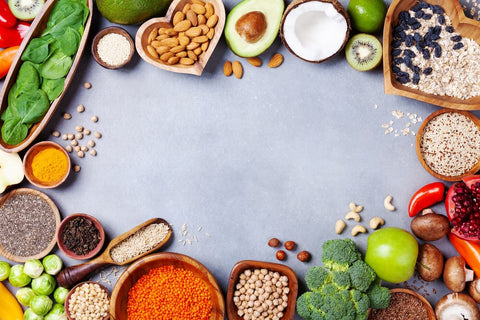Navigating your 20s and 30s involves more than just career and personal growth; these years are crucial for establishing a foundation for long-term health. Optimal nutrition during this period supports not only your daily energy needs but also sets the stage for healthy aging. In this guide, we explore how to adapt your diet for these pivotal decades and introduce VORG All-in-One SuperShake as a convenient nutritional solution.
Nutritional Needs by the Decade
Essentials for Your 20s
During your 20s, your body demands high energy to match an active lifestyle and cope with metabolic peaks. A balanced intake of carbohydrates, proteins, and fats is essential. Women, in particular, need to focus on iron due to menstrual losses and both genders should ensure adequate calcium intake to build bone density.
What nutrients do 20 year olds need?
20-year-olds need a robust intake of iron, calcium, vitamin D, and high-quality proteins to support active growth phases and high energy demands.
Adjusting for Your 30s
Transitioning into your 30s, your metabolism starts to slow down, necessitating adjustments in your diet to maintain health and prevent weight gain. This includes increasing your intake of fiber and protein to enhance satiety and metabolic rate, adding antioxidants to your diet to counteract aging, and reducing overall caloric intake to match your changing metabolic rate.
What should you eat in your 30s?
In your 30s, prioritize fiber-rich foods, lean proteins, and antioxidants. These help manage metabolism, support cellular health, and mitigate early signs of aging.
Key Nutrients for Your 20s and 30s
Focus on nutrients that support long-term health:
- Calcium and Vitamin D: Essential for maintaining strong bones.
- Magnesium: Supports muscle function and various metabolic processes.
- Folic Acid: Particularly important for women contemplating pregnancy, aiding in fetal development.
Strategies for Busy Lifestyles
With busy schedules, maintaining a balanced diet can be challenging. Effective meal planning involves dedicating a few hours each week to prepare meals that are quick to reheat. Choosing snacks that are high in protein and fiber can help maintain energy levels between meals.
Common Dietary Questions Explored
Weight Management in Your 30s
As metabolism slows in your 30s, maintaining a healthy weight requires a balanced diet rich in vegetables, lean proteins, and whole grains, complemented by regular physical activity that includes both cardio and strength training to enhance metabolic health.
Fitness and Aging Considerations
Integrating resistance training into your fitness routine is essential to counteract the natural loss of muscle mass as you age. This helps in maintaining a higher metabolic rate and supports overall muscle and joint health.
Introducing VORG All-in-One SuperShake
For those managing a fast-paced lifestyle, Supershake provides a nutritious, quick meal replacement or supplement that delivers essential vitamins, minerals, and protein. This shake is designed to support an active lifestyle and can help fill any nutritional gaps in your diet.
Expanded FAQs for Enhanced Understanding
Can you get healthy in your 30s?
Your 30s are a great time to adopt healthy habits that can significantly improve your quality of life. Introducing balanced meals and regular physical activity can transform your health outlook.
Is it too late to start eating healthy at 30?
It's never too late to start eating healthy. Beginning in your 30s can still have profound benefits on your energy levels, metabolic health, and longevity.
Can you lose fat in your 30s?
Yes, with the right diet and exercise plan, losing fat in your 30s is entirely achievable. Focus on creating a caloric deficit through a balanced diet and regular exercise.
Does your body change in your 30s?
Yes, your body starts to experience metabolic changes, possible muscle mass decline, and in some cases, hormonal shifts that can affect overall health.
How can I improve my life in my 30s?
Improving your life in your 30s can involve optimizing your diet, engaging in regular physical activity, managing stress, and ensuring adequate sleep.
Can you get really fit in your 30s?
You can achieve excellent fitness levels in your 30s with commitment to regular exercise including strength training, cardio, and flexibility workouts.
How can nutrition help avoid aging in your 30s?
Nutrition can play a crucial role in mitigating aging by supplying antioxidants that combat free radicals, and nutrients that support skin health and cellular repair.
How should my diet change as I transition from my 20s to my 30s?
Focus on increasing nutrient density rather than merely calorie counting.
Can dietary choices impact energy levels?
Yes, selecting whole, unprocessed foods helps maintain higher energy levels.
What are the best dietary practices for preventing aging in my 30s?
Incorporate a variety of antioxidants and healthy fats to support skin health and cellular integrity.
Conclusion: Embracing Nutritional Excellence
Your 20s and 30s are key times for embedding healthy eating habits that promote vitality and longevity. With the right information and tools like VORG All-in-One Shake, you can easily meet your dietary needs while enjoying the dynamic years of young adulthood. Start today to build a healthier tomorrow!


